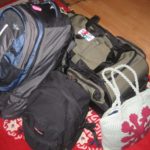1. Mail should be sent directly to the Yaoundé address, OR directly t your Volunteer’s post address once training is finished.
2. Both Volunteers and family members should number letters sent so that the receiver can determine whether any letters do not arrive.
3. Packages should be sent via air, not surface mail (surface mail has been known to take longer
than two years to arrive.)
4. Sending packages to your Volunteer in Cameroon is a risky proposition. Theft of packages is
not only a problem in the Cameroonian postal system, it also occurs on the U.S. side. Although occasionally a package arrives quickly and without problems, it may take months or it may get
“lost” along the way. Therefore, it is not advisable to send valuables this way.
5. If you do send packages, bubble envelopes seem to work better than large boxes. They are
less tempting to would-be thieves. The sender should clearly and honestly mark the contents
on the outside of the package, but a general description of the contents is sufficient: “clothing
and candy” rather than “Nike high top sneakers and 2 lbs. Godiva chocolate.”
6. Express mail is an expensive option that may take just as long to get to Cameroon. Perhaps
a more secure option than regular airmail for documents, checks, etc., it is subject to more
scrutiny by Cameroonian customs than regular mail. For items other than documents, Peace
Corps staff has to submit import licenses to customs, and clearance can take up to 10 days.
Thus, you may not necessarily save any time by using Express mail. DHL and UPS operate in Cameroon for those important documents. Note that current prices for these services run
around $100.00 for one pound or less.
7. There is a tax which Volunteers will have to pay on all packages received before they can
retrieve them from the post office. This tax varies according to the size of the package. It might
be a nice gesture from friends or family to send a six-pack of Mountain Dew, but it may cost a Volunteer up to $10.00 to get it out of the post office.
8. Packages sent to the Yaoundé office are sent regularly to Volunteer posts. This may delay
delivery to the Volunteer by up to several weeks.
9. If Volunteers wish to send a package from Yaoundé to the States, Cameroon postal rates
are high and insurance is not available. For this reason, many Volunteers wait to send
packages with returning PCVs (whom they ask first, in country) or wait until their Completion of Service (COS) date to send home gifts and souvenirs. Letters going to the States through the Cameroon post have been quite dependable.
10. US postage-stamped letters can be put in the “next traveler” box at the Peace Corps office
in Yaoundé, to be hand carried by the next person going Stateside. Note that this is a courtesy,
not an obligation, and Volunteers shouldn’t expect any traveler to carry more than letter mail, unless special arrangements are made with the individual. Air travelers may be required to
open letters and packages and/or submit them to X-rays, especially when they don’t belong to
the traveler.
11. The Cameroon Desk in Peace Corps Headquarters, Washington, is available to answer
Volunteer & families’ questions about mail. Due to staff and budget constraints, they cannot, however, facilitate the sending of personal mail for Trainees and Volunteers.






